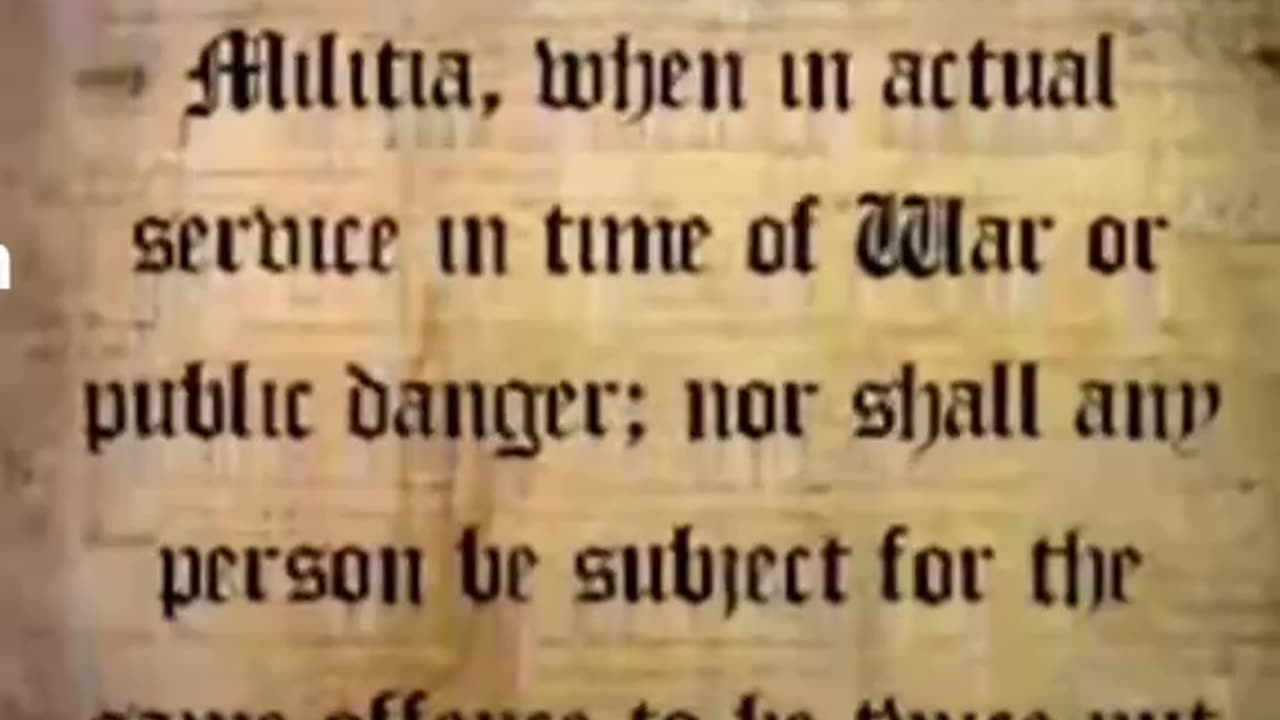Premium Only Content

The Bill of Rights, short refresher version!
Bill of Rights
Amendment 1 Freedoms, Petitions, Assembly
Amendment 2 Right to bear arms
Amendment 3 Quartering of soldiers
Amendment 4 Search and arrest
Amendment 5 Rights in criminal cases
Amendment 6 Right to a fair trial
Amendment 7 Rights in civil cases
Amendment 8 Bail, fines, punishment
Amendment 9 Rights retained by the People
Amendment 10 States' rights
Amendment 11 Lawsuits against states
Amendment 12 Presidential elections
Amendment 13 Abolition of slavery
Amendment 14 Civil rights
Amendment 15 Black suffrage
Amendment 16 Income taxes
Amendment 17 Senatorial elections
Amendment 18 Prohibition of liquor
Amendment 19 Women's suffrage
Amendment 20 Terms of office
Amendment 21 Repeal of Prohibition
Amendment 22 Term Limits for the Presidency
Amendment 23 Washington, D.C., suffrage
Amendment 24 Abolition of poll taxes
Amendment 25 Presidential succession
Amendment 26 18-year-old suffrage
Amendment 27 Congressional pay raises
Original Ten Amendments: The Bill of Rights
Passed by Congress September 25, 1789.
Ratified December 15, 1791.
Amendment I
Freedoms, Petitions, Assembly
Congress shall make no law respecting an establishment of religion, or prohibiting the free exercise thereof; or abridging the freedom of speech, or of the press, or the right of the people peaceably to assemble, and to petition the Government for a redress of grievances.
Amendment II
Right to bear arms
A well regulated Militia, being necessary to the security of a free State, the right of the people to keep and bear Arms, shall not be infringed.
Amendment III
Quartering of soldiers
No Soldier shall, in time of peace be quartered in any house, without the consent of the Owner, nor in time of war, but in a manner to be prescribed by law.
Amendment IV
Search and arrest
The right of the people to be secure in their persons, houses, papers, and effects, against unreasonable searches and seizures, shall not be violated, and no Warrants shall issue, but upon probable cause, supported by Oath or affirmation, and particularly describing the place to be searched, and the persons or things to be seized.
Amendment V
Rights in criminal cases
No person shall be held to answer for a capital, or otherwise infamous crime, unless on a presentment or indictment of a Grand Jury, except in cases arising in the land or naval forces, or in the Militia, when in actual service in time of War or public danger; nor shall any person be subject for the same offence to be twice put in jeopardy of life or limb, nor shall be compelled in any criminal case to be a witness against himself, nor be deprived of life, liberty, or property, without due process of law; nor shall private property be taken for public use, without just compensation.
Amendment VI
Right to a fair trial
In all criminal prosecutions, the accused shall enjoy the right to a speedy and public trial, by an impartial jury of the State and district wherein the crime shall have been committed; which district shall have been previously ascertained by law, and to be informed of the nature and cause of the accusation; to be confronted with the witnesses against him; to have compulsory process for obtaining witnesses in his favor, and to have the assistance of counsel for his defense.
Amendment VII
Rights in civil cases
In Suits at common law, where the value in controversy shall exceed twenty dollars, the right of trial by jury shall be preserved, and no fact tried by a jury shall be otherwise re-examined in any Court of the United States, than according to the rules of the common law.
Amendment VIII
Bail, fines, punishment
Excessive bail shall not be required, nor excessive fines imposed, nor cruel and unusual punishments inflicted.
Amendment IX
Rights retained by the People
The enumeration in the Constitution of certain rights shall not be construed to deny or disparage others retained by the people.
Amendment X
States' rights
The powers not delegated to the United States by the Constitution, nor prohibited by it to the States, are reserved to the States respectively, or to the people.
-
 57:00
57:00
PMG
9 hours ago"Hannah Faulkner and Grace Reilly | 10 MILLION Gun Owners AREN'T Registered To Vote?!"
301 -
 32:09
32:09
BonginoReport
4 hours agoBeauty is Back (Ep.123) - 01/22/2025
22.9K27 -
 1:06:17
1:06:17
Dad Dojo Podcast
11 hours ago $0.28 earnedEP17: From the Vault - Don't Rush Your Kids
3.46K -
 LIVE
LIVE
AP4Liberty
2 hours ago $2.69 earnedDonald Trump's Nod to the Libertarian Movement: A Free Ross Ulbricht
1,252 watching -
 LIVE
LIVE
Vigilant News Network
10 hours agoWINNING: Trump WITHDRAWS From the CORRUPT World Health Organization | The Daily Dose
1,399 watching -

Jeff Ahern
1 hour agoNever Woke Wednesday with Jeff Ahern (6am pacific)
6.92K1 -
 10:45
10:45
EvenOut
13 hours ago $1.86 earnedThe Non-Reflecting Mirror On Omegle Twin Prank!
26K3 -
 20:07
20:07
Scammer Payback
15 hours ago$4,000,000 Trap set on a Scammer
72.1K5 -
 5:45
5:45
Tactical Advisor
1 day agoWoox New Lever Action | Shot Show 2025
33.8K3 -
 16:25
16:25
Clownfish TV
13 hours agoDEI is Deader Than Disco! Hollywood Most Affected?!
27.6K5